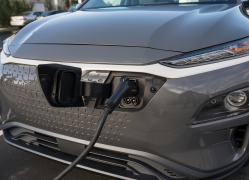
— Hyundai Kona Electric battery problems are allegedly caused by cells that short-circuit and cause owners to dial 911.
Hyundai announced what it believes is the root cause of battery fires as the National Highway Traffic Safety Administration issued a U.S. recall for nearly 4,700 model year 2019-2020 Kona Electric and 2020 Ioniq Electric vehicles.
A separate recall in Canada includes about 3,500 Hyundai electric vehicles.
Owners of those electric vehicles are warned to park away from structures that could burn.
At least 15 Hyundai Kona Electric battery fires have been reported, but Hyundai says to date none have occurred in the U.S.
According to Hyundai, the battery cells have anode (negative) tabs that can be folded which could allow the lithium plating on the tabs to contact the cathodes. The automaker says the batteries were manufactured at an LG Energy Solutions plant in Nanjing, China.
The U.S. battery recall follows a Hyundai Kona Electric battery recall announced in October 2020. Both recalls involve electric vehicles that can catch fire while parked with the batteries fully charged.
The Hyundai Kona Electric and Ioniq Electric battery recall is expected to begin April 30, 2021. Hyundai dealers will replace the battery system assemblies, but that won't happen until replacement parts are available.
Until then, Kona Electric and Ioniq Electric owners will be provided instructions to perform battery updates through the infotainment systems. Customers can also choose to have Hyundai dealers perform the updates.
The Hyundai battery update will reportedly lower the state of charge limit to prevent the battery from being fully charged to 100%.
Replacement batteries will be built with insulation coating on the cathodes within the battery cells which will allegedly prevent electrical shorts and the resulting fires.
Again, affected Kona Electric and Ioniq Electric vehicles should be parked outside and away from anything that can burn, at least until the battery systems are updated.
Hyundai said in February the electric vehicle battery recall would cost nearly $900 million, but an agreement has now been reached between Hyundai and battery manufacturer LG Chem to share the cost.
LG initially denied its battery cells were defective, but the agreement will allegedly require LG Chem to pay 70% of the cost to replace the Hyundai Kona Electric and Ioniq Electric batteries.
Hyundai Kona Electric and Ioniq Electric owners with questions or concerns should call Hyundai at 855-371-9460 and ask about battery recall number 200.




